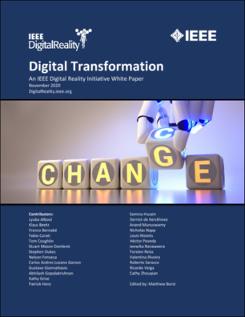El sistema se apagará debido a tareas habituales de mantenimiento. Por favor, guarde su trabajo y desconéctese.
Digital Transformation
Fecha
2020-11-01Autor
Poveda, Héctor
Alboul, Lyuba
Beetz, Klaus
Bernabé, Franco
Carati, Fabio
Couglin, Tom
Mason Dambrot, Stuart
Dukes, Stephen
Fonseca, Nelson
Lozano Garzon, Carlos Andres
Giannattasio, Gustavo
Gopalakrishnan, Abhilash
Grise, Kathy
Henz, Patrick
Husain, Samina
De Kerckhove, Derrick
Munuswamy, Anand
Napp, Nicholas
Nisiotis, Louis
Ranaweera, Jeewika
Reiss, Torsten
Rivoira, Valentina
Saracco, Roberto
Veiga, Ricardo
Zhouqian, Cathy
Metadatos
Mostrar el registro completo del ítemResumen
The amount of literature on Digital Transformation is staggering—and it keeps growing. Why, then,
come out with yet another such document? Moreover, any text aiming at explaining the Digital
Transformation by presenting a snapshot is going to become obsolete in a blink of an eye, most likely to
be already obsolete at the time it is first published.
The FDC Initiative on Digital Reality felt there is a need to look at the Digital Transformation from the
point of view of a profound change that is pervading the entire society—a change made possible by
technology and that keeps changing due to technology evolution opening new possibilities but is also a
change happening because it has strong economic reasons. The direction of this change is not easy to
predict because it is steered by a cultural evolution of society, an evolution that is happening in niches
and that may expand rapidly to larger constituencies and as rapidly may fade away. This creation,
selection by experimentation, adoption, and sudden disappearance, is what makes the whole scenario
so unpredictable and continuously changing.
come out with yet another such document? Moreover, any text aiming at explaining the Digital
Transformation by presenting a snapshot is going to become obsolete in a blink of an eye, most likely to
be already obsolete at the time it is first published.
The FDC Initiative on Digital Reality felt there is a need to look at the Digital Transformation from the
point of view of a profound change that is pervading the entire society—a change made possible by
technology and that keeps changing due to technology evolution opening new possibilities but is also a
change happening because it has strong economic reasons. The direction of this change is not easy to
predict because it is steered by a cultural evolution of society, an evolution that is happening in niches
and that may expand rapidly to larger constituencies and as rapidly may fade away. This creation,
selection by experimentation, adoption, and sudden disappearance, is what makes the whole scenario
so unpredictable and continuously changing.
